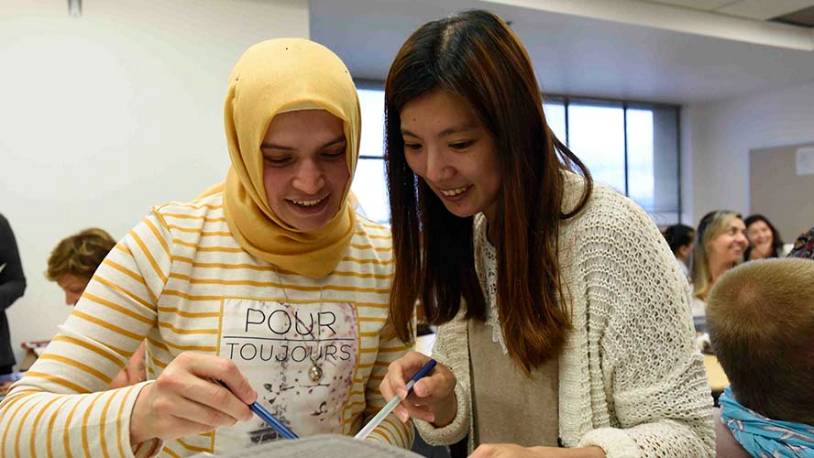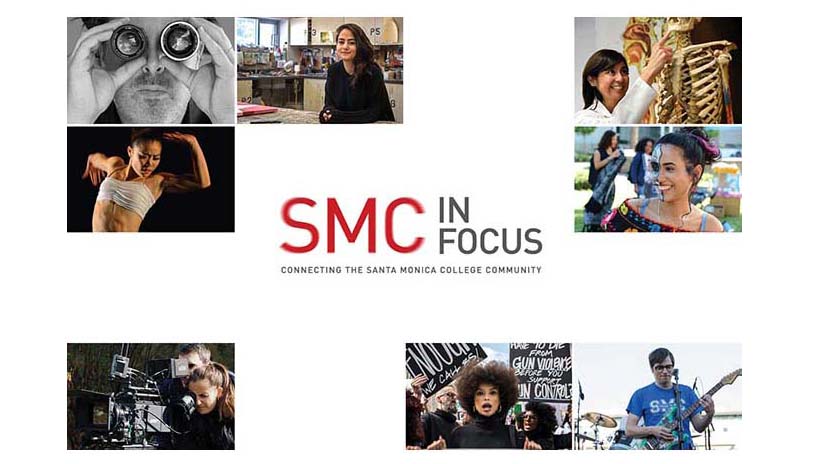
SMC Expands Noncredit Options for Adult Learners
Thanks to new legislation and $386,508 in funding from Assembly Bill 104: The Adult Education Block Grant (AEBG), Santa Monica College is expanding its noncredit continuing education programs for underserved adult learners age 18 and up. The AEBG funds will be used to help develop and establish "seamless transitions" for adult students in the areas of basic and secondary education, English as a Second Language (ESL), short-term vocational training (including Career Technical Education programs), workforce preparation, programs and activities for older adults, and programs and services for students with disabilities.
SMC was awarded the grant as a partner – with the Santa Monica-Malibu Unified School District (SMMUSD) – in the Santa Monica Regional Consortium for Adult Education. The consortium was established in 2014 to respond to the education and training needs of the region’s adult workforce.
SMC’s consortium members plan to use their allocation to develop and offer faculty and staff opportunities for professional development with a focus on underserved adult learners who would like to make the transition to a credit-based college education and/or into the workforce. Also, Career Technical Education (CTE) faculty at SMC have teamed up with Dr. Dione Carter, SMC’s Dean of Noncredit and External Programs, and Laura Manyweather, the Interim Project Manager of Adult Education Programs, to develop a variety of short-term noncredit CTE courses and have them ready for students in late Spring or Fall 2017.
"I am very excited about SMC’s collaborative effort with the Santa Monica-Malibu Unified School District and community partners," said Dr. Carter. "After serving in the California community college system for nearly 25 years, including 8 years at the North Orange County Community College District’s School of Continuing Education, I joined SMC because I saw the potential to grow the College’s noncredit education programs and benefit our community by providing the resources and opportunities to address the academic and career needs of our underserved adult students."
SMC’s current noncredit courses range from the popular Older Adults programs at SMC’s Emeritus campus to noncredit ESL courses. The noncredit courses are no-cost or low-cost in nature, and aim to prepare students who need a "helping hand" to succeed in credit courses and seek gainful employment.
For example, SMC’s noncredit English as a Second Language (ESL) classes, along with U.S. Citizenship classes that are also offered in the noncredit program, have made it possible for students to participate in and become part of American society. The noncredit ESL classes – offered at beginning, intermediate, and advanced levels – cover listening, speaking, reading, writing, and conversation, with digital literacy recently added to encourage safe use of the Internet and online tools to communicate and collaborate with others.
ESL instructor Melody Nightingale says that providing students a pathway to career and academic success is a privilege for her.
"What I love best about teaching ESL is the ever changing diversity in the classroom-we are familiar with some places in the world but unfamiliar with others," says Melody. "I also learn something from my students on a regular basis. They think that I am teaching them, but the reality is that we are learning from each other."
All of the noncredit programs at SMC undergo the same curriculum course approval and program processes as the credit courses do. New noncredit courses currently under development by SMC faculty include CTE courses in the areas of Business, Chemistry, Computer Science and Information Systems, Early Childhood Education, Health, and Kinesiology.
The new noncredit CTE courses will be designed to not only help students make a successful transition to a new job or a promotion in a current job, but also serve as a gateway to SMC’s credit courses. In addition, SMC counselors are developing a noncredit course to help students make the transition from noncredit education to for-credit college courses.
Manyweather – who was recently hired by SMC to oversee adult education program grants, including SMC’s AEBG activities and funds – is looking forward to expanding SMC’s adult education opportunities. "I came to work at SMC from Los Angeles Southwest College, where I wrote and administered grants for almost a decade," she said. "I have a lot of experience in dealing with grants related to CTE programs, and I’m really looking forward to combining my CTE background with Dr. Carter’s extensive experience in developing and managing noncredit/adult education programs."
SMC’s noncredit programs have long provided the community with open access to educational opportunities and lifelong learning. To find out more about the noncredit programs for adults, please call Dr. Dione Carter at 310-434-4858 or Laura Manyweather at 310-434-3421.
* * *



